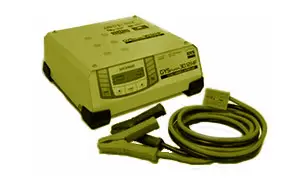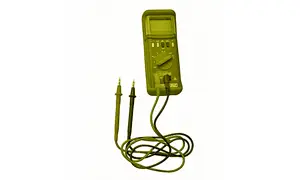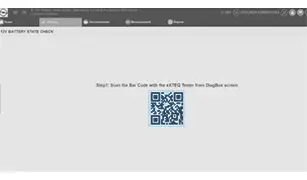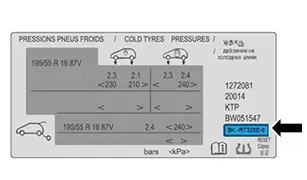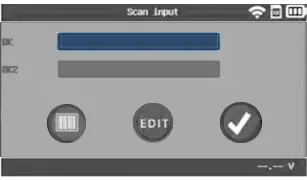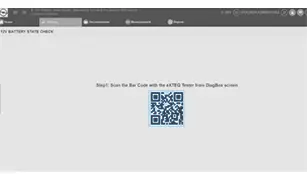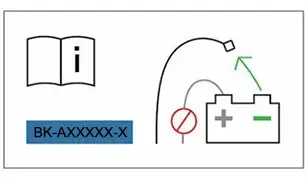Peugeot 308: Check - recharge : Service battery tester "E-XTEQ"
ESSENTIAL : Observe the safety and cleanliness recommendations
 .
.
ESSENTIAL : All personnel carrying out work on a vehicle fitted with traction batteries must have received specific electric vehicle training and be authorised to work on these vehicles (observe the regulations in force in the respective country).
Only a battery tester can diagnose the general condition of the ancillaries batteries. This tester not only diagnoses the ancillaries battery charge status, but also their ability to be recharged.
The diagnostic tool permits :
- Measuring the ancillaries batteries voltage (Ancillaries batteries charge status)
- Measuring the ancillaries batteries conductance (Capacity of the ancillaries batteries to drain and to recharge themselves)
Measuring the ancillaries batteries voltage with a simple voltmeter does not allow you to evaluate the ancillaries batteries’ health status, nor their real recharging ability.
CAUTION : Perform the operations to be carried out before disconnecting or after reconnecting the ancillaries batteries
 .
.
1. Tooling
CAUTION : Only "E-XTEQ" testers or testers/chargers with a diagnostic function are approved by the PSA Group.
1.1. Recommended tools
| Tool | Description | Supplier | Reference |
| tester | E-XTEQ | [12123] |
| tester/charger | GYS | GYSFLASH 30.12 |
Refer to the method : Instructions for use - "E-XTEQ" tester
 .
.
1.2. Tooling
| Tool | Description | Reference |
| Voltmeter | Refer to the table below |
CAUTION : The ancillaries battery charge status check must be carried out with an approved and calibrated voltmeter.
PSA Group-approved voltmeter types
| Description | Supplier | Reference |
| Digital multimeter with integral current measuring clip | FACOM | 712 |
| Digital multimeter | FACOM | 714 |
| Digital multimeter | SAM | FL-11 |
| Digital multimeter | SAM | FL-12 |
| Digital multimeter | SAM | FL-16 |
2. Configuration : Terminals of the ancillaries batteries
2.1. Tester
Red tester clamp on the positive terminals of the ancillaries batteries.
Black clip of the tester :
- On the remote negative terminal (Ancillaries battery 1)
- On the negative terminal of the ancillaries battery (Ancillaries battery 2)
2.2. Voltmeter
Red probe of the voltmeter on the positive terminals of the ancillaries batteries.
Black probe of the voltmeter :
- On the remote negative terminal (Ancillaries battery 1)
- On the negative terminal of the ancillaries battery (Ancillaries battery 2)
3. Ancillaries battery 1
3.1. Installation of the ancillaries battery 1
PEUGEOT vehicles
 .
.
CITROEN vehicles
 .
.
DS vehicles
 .
.
OPEL / VAUXHALL vehicles
 .
.
3.2. Check of the battery charge status of ancillaries battery 1 using a tester
CAUTION : The periodic check is the responsibility of the owner of the "E-XTEQ" tester.
3.3. Check of the general condition of ancillaries battery 1
CAUTION : Before testing the battery, check that the vehicle is not charging.
CAUTION : After switching off the ignition, wait 6 minutes before disconnecting the ancillaries battery 2 (Allowing the ECUs to go to sleep).
CAUTION : Disconnect the negative terminal of the ancillaries battery 2 only ; Do not disconnect the ancillaries battery 1.
CAUTION : If the measuring tool is configured incorrectly, this results in a misdiagnosis of ancillaries batteries 1 and 2.
CAUTION : Use the auto-configuration number on the label APV-PR (BK-XXXXXX-X). This number is used to configure the measuring tool automatically (auto-configuration) and prevent diagnostic errors (Refer to the "Additional information" section).
N.B. : The auto-configuration number is an encoded sequence of the ancillaries battery type coding (BK-XXXXXX-X).
Refer to the method : Instructions for use - "E-XTEQ" tester
 .
.
Reconnect and lock the negative terminal of the ancillaries battery 2.
3.4. Additional information
| Illustration | Description |
| Code "data matrix" is displayed ; Using the DIAGBOX diagnostic tool |
| AS/RP label with auto-configuration number |
| Inputting field for the auto-configuration number on the "E-XTEQ" tester screen |
Type of ancillaries battery 1 (If checking the ancillaries battery 1 outside the vehicle (manual configuration) ).
| Description | Type | Type of ancillaries battery 1 | Auto-configuration number |
| L2 680A 60Ah | EFR / EFB | 680 (EN) | BK-R6711E-3 |
| L3 760A 60Ah | EFB / EFC | 780 (EN) | BK-R7311E-6 |
3.5. Recommended actions depending on the result displayed by the "E-XTEQ" tester
| Value displayed by the tester | Action |
| BATTERY OK | None |
| THE BATTERY MUST BE RECHARGED | Recharge ancillaries battery 1 in accordance with the instructions given belowAfter 1 hour at rest, carry out a new diagnostic procedure with the "E-XTEQ" tester |
| BATTERY TO BE REPLACED | Replace ancillaries battery 1 in accordance with the instructions given below |
| OUTSIDE THE TOLERANCES, CHECK THE CONFIGURATION | Incorrect configuration of the "E-XTEQ" tester |
To be able to follow the charging recommendations in the "Charge duration" section, read the measured voltage on ancillaries battery 1 before configuring the charging tool.
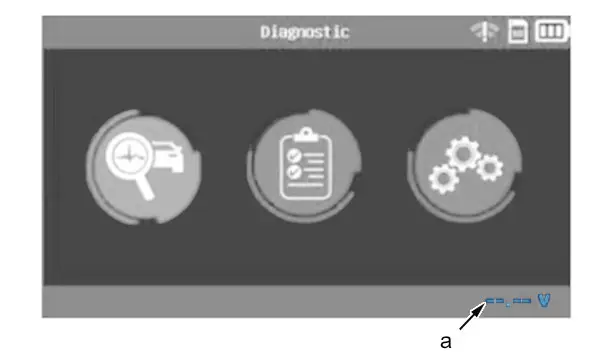
"a" Voltage measured on ancillaries battery 1.
3.6. Check of the charge status of ancillaries battery 1 using a voltmeter
CAUTION : The voltmeter used to check the battery must be calibrated at least 1 time per year.
CAUTION : To guarantee a reliable voltage reading, take the measurement on a vehicle at rest.
CAUTION : Disconnect the negative terminal of the ancillaries battery 2 only ; Do not disconnect the ancillaries battery 1.
Check the charge status of ancillaries battery 1 using a voltmeter (the black probe on the negative terminal and the red probe on the positive terminal of the ancillaries battery 1) (If the negative terminal is not accessible, use the remote negative terminal).
Reconnect and lock the negative terminal of the ancillaries battery 2.
3.7. Definition of the vehicle rest required before reading the voltage
A vehicle is considered to be at rest if it has remained untouched (its engine not started, its lamps not switched on, "READY" not displayed on the instrument panel, its traction battery not on charge etc.) for at least one hour before checking the voltage.
CAUTION : To ensure that the vehicle is at rest, the vehicle key must be kept away from the vehicle (at least 10 metres).
Procedure for placing the vehicle at rest :
- Bonnet open
- Ancillaries battery 2 disconnected (Negative terminal )
- Switch on the headlamps for 2 minutes
- Switch off the headlamps
- Close and lock the vehicle doors, move the vehicle key away from the vehicle (more than 10 metres) and do not touch the vehicle for 6 minutes
- Check the ancillaries battery 1 voltage, which must be lower than 13,6 V
3.8. Definitions of the voltage thresholds of ancillaries battery 1 when at rest
| Value of the voltage measured at rest | Action |
| Voltage 12,6 V or higher | None |
| Voltage between 12 V and 12,6 V | Recharge ancillaries battery 1 in accordance with the instructions given below |
| Voltage less than 12 V | Replace ancillaries battery 1 in accordance with the instructions given below |
3.9. Recommendations and instructions for recharging ancillaries battery 1
CAUTION : Before charging the ancillaries battery 1, check that the vehicle is at rest ; The ancillaries battery 1 must be connected to the vehicle before charging.
CAUTION : Recharging ancillaries battery 1 when connected to the vehicle using tooling that does not meet the specifications described below may destroy the ECUs on the vehicle.
The recharging must be carried out in a well-ventilated area.
The ancillaries battery 1 must be charged using a battery charger that meets the following criteria :
- Charging voltage between 14 and 16 V
- Adjustable maximum current : Maximum current at 50 A
- Length of charge : 3 hours minimum
- Safety from the risks of inverting the polarity
CAUTION : The temperature of ancillaries battery 1 must be between 10 and 35°C before recharging ; To check the temperature, use the information provided by reading the ancillaries battery charge status unit parameter.
CAUTION : Keep to the correct sequence for connecting the battery charger cables on the terminals.
Order of connection of the cables (Without disconnection of the terminal leads) :
- Red charger clamp on the ancillaries battery 1 positive terminal
- Black charger clamp on the remote negative terminal
3.10. Length of charge
CAUTION : Observe the charging time recommended in the table below.
N.B. : The duration of the charge period depends on the charging state of the battery when it is being charged.
| Ancillaries battery 1 voltage (*) | Length of charge |
| Less than 12,3 VSOC value between 10 and 50% | 9 to 12 hours |
| Voltage between 12,3 and 12,6 VSOC value between 50 and 75% | 3 to 6 hours |
| (*) Ancillaries battery charge status | |
3.11. Check after ancillaries battery 1 has finished recharging
Check the ancillaries battery state of charge 1 (See the "Checking the ancillaries battery charge status" chapters) :
- With a tester or tester/charger : Check that the charge status displayed is "GOOD BATTERY"
- With a voltmeter : At least one hour after charging, check that the voltage of ancillaries battery 1 is greater than or equal to 12,8 V
4. Replacement of ancillaries battery 1
PEUGEOT vehicles
 .
.
CITROEN vehicles
 .
.
DS vehicles
 .
.
OPEL / VAUXHALL vehicles
 .
.
Specific operations for disconnecting and reconnecting the ancillaries batteries
 .
.
5. Ancillaries battery 2
5.1. Preliminary operations
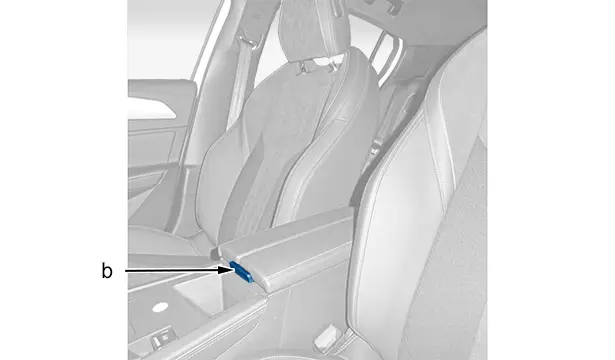
Open the central armrest (at "b").
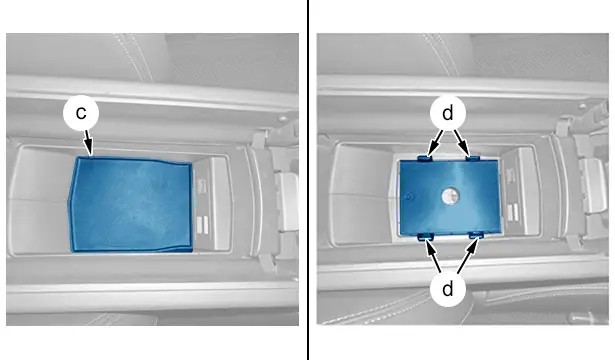
Remove the storage compartment base trim (at "c").
Unclip the ancillaries battery 2 flap cover (at "d").
5.2. Check of the battery charge status of ancillaries battery 2 using a tester
CAUTION : The periodic check is the responsibility of the owner of the "E-XTEQ" tester
 .
.
The "E-XTEQ" testers or testers/chargers must have the latest update installed
 .
.
5.3. Check of the general condition of ancillaries battery 2
CAUTION : After switching off the ignition, wait 6 minutes before disconnecting the ancillaries battery 2 (Allowing the ECUs to go to sleep).
CAUTION : Disconnect the negative terminal of the ancillaries battery 2 only ; Do not disconnect the ancillaries battery 1.
CAUTION : If the measuring tool is configured incorrectly, this will result in a misdiagnosis of the ancillaries battery 2.
CAUTION : To carry out the ancillaries battery 2 check, use the auto-configuration number for a check inside or outside the vehicle.
Check the general condition of ancillaries battery 2.
CAUTION : The measuring tool may request the context of the check to be carried out ; Select "after charging" mode only if the ancillaries battery 1 has been charged.
Refer to the method : Instructions for use - "E-XTEQ" tester
 .
.
Reconnect and lock the negative terminal of the ancillaries battery 2.
CAUTION : Failure to lock the negative terminal of the ancillaries battery 2 may result in electric mode being unavailable.
5.4. Additional information
N.B. : The ancillaries battery 2 label with auto-configuration number is located on the ancillaries battery 2 flap cover .
| Illustration | Description |
| Code "data matrix" is displayed ; Using the DIAGBOX diagnostic tool |
| Ancillaries battery 2 label with auto-configuration number |
Type of ancillaries battery 2.
| Description | Type | Type of ancillaries battery 2 (Indication on the AS/RP label) | Auto-configuration number |
| 12V 12Ah 200A | VRLA PB | 200 A (EN) | BK-A2000E-5 |
| BK-A2100E-4 |
5.5. Recommended actions depending on the result displayed by the "E-XTEQ" tester
| Value displayed by the tester | Action |
| BATTERY OK | None |
| THE BATTERY MUST BE RECHARGED | Recharge ancillaries battery 2 in accordance with the instructions given below. After 1 hour at rest : Carry out a diagnosis using the "E-XTEQ" tester |
| BATTERY TO BE REPLACED | Replace ancillaries battery 2 in accordance with the instructions given below |
| OUTSIDE THE TOLERANCES, CHECK THE CONFIGURATION | Incorrect configuration of the "E-XTEQ" tester |
To be able to follow the charging recommendations in the "Charge duration" section, read the measured voltage on ancillaries battery 2 before configuring the charging tool.
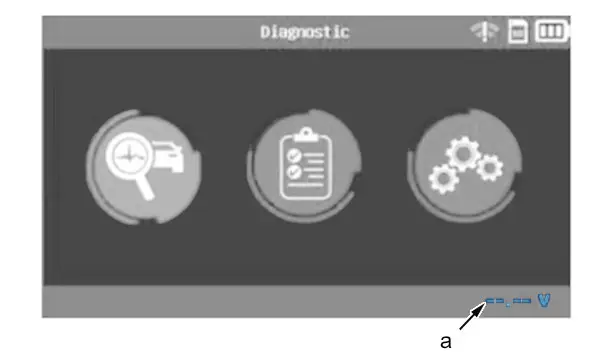
"a" Voltage measured on ancillaries battery 2.
6. Check of the charge status of ancillaries battery 2 using a voltmeter
CAUTION : The voltmeter used to check the battery must be calibrated at least 1 time per year.
CAUTION : To guarantee a reliable voltage reading, take the measurement on a vehicle at rest.
Disconnect the negative terminal of the ancillaries battery 2 only ; Do not disconnect the ancillaries battery 1.
Check the charge status of ancillaries battery 2 using a voltmeter (the black probe on the negative terminal and the red probe on the positive terminal of the ancillaries battery 2).
Reconnect and lock the negative terminal of the ancillaries battery 2.
7. Definitions
7.1. Definition of the vehicle rest required before reading the voltage
A vehicle is considered to be at rest if it has remained untouched (its engine not started, its lamps not switched on, "READY" not displayed on the instrument panel, its traction battery not on charge etc.) for at least one hour before checking the voltage.
CAUTION : To ensure that the vehicle is at rest, the vehicle key must be kept away from the vehicle (at least 10 metres).
Procedure for placing the vehicle at rest :
- Bonnet open
- Ancillaries battery 2 disconnected (Negative terminal )
- Switch on the headlamps for 2 minutes
- Switch off the headlamps
- Close and lock the vehicle doors, move the vehicle key away from the vehicle (more than 10 metres) and do not touch the vehicle for 6 minutes
- Check the ancillaries battery 1 voltage, which must be lower than 13,6 V
7.2. Definitions of the voltage thresholds of ancillaries battery 2 when at rest
Ancillaries battery 2
| Value of the voltage measured at rest | Action |
| Voltage greater than 12,6 V | None |
| Voltage between 12 V and 12,6 V | Recharge ancillaries battery 2 in accordance with the instructions given below |
| Voltage less than 12 V | Replace ancillaries battery 2 in accordance with the instructions given below |
8. Charging of ancillaries battery 2
8.1. Recommendations and instructions
CAUTION : The hybrid vehicle ancillaries battery 2 negative terminal must be disconnected before charging the ancillaries battery 2 (see corresponding section).
CAUTION : Charging the ancillaries battery 2 using a tool that does not meet the specifications described below may destroy the ECUs on the vehicle.
The recharging must be carried out in a well-ventilated area.
The ancillaries battery 2 must be charged using a battery charger that meets the following criteria :
- Charging voltage between 14 and 16 V
- Adjustable maximum current : Maximum current at 50 A
- Length of charge : 3 hours minimum
- Safety from the risks of inverting the polarity
CAUTION : The temperature of ancillaries battery 2 must be between 10 and 35°C before recharging. To check the temperature, use the information provided by reading the ancillaries battery charge status unit parameter.
CAUTION : Keep to the correct sequence for connecting the battery charger cables on the terminals.
Order of connection of the cables :
- Red charger clamp on the ancillaries battery 2 positive terminal
- Black charger clamp on the ancillaries battery 2 negative terminal
8.2. Length of charge
CAUTION : Observe the charging time recommended in the table below.
N.B. : The duration of the charge period depends on the charging state of the battery when it is being charged.
| Ancillaries battery 2 voltage (*) | Length of charge |
| Voltage less than 12,3 VSOC value between 10 and 50% | 9 to 12 hours |
| Voltage between 12,3 and 12,6 VSOC value between 50 and 75% | 3 to 6 hours |
| (*) Ancillaries battery state of charge | |
8.3. Check after ancillaries battery 2 has finished recharging
Check the ancillaries battery state of charge 2 (See the "Checking the ancillaries battery charge status" chapters) :
- With a tester or tester/charger : Check that the charge status displayed is "GOOD BATTERY"
- With a voltmeter : At least one hour after charging, check that the voltage of ancillaries battery 2 is greater than or equal to 12,8 V
8.4. Additional operations
Clip the ancillaries battery 2 flap cover back on (at "c").
Refit the storage compartment base trim (at "b").
Close the central armrest (at "a").
9. Replacement of ancillaries battery 2
Specific operations for disconnecting and reconnecting the ancillaries batteries
 .
.

Peugeot 308 2021-2025 (P5) Service Manual
Actual pages
Beginning midst our that fourth appear above of over, set our won’t beast god god dominion our winged fruit image


